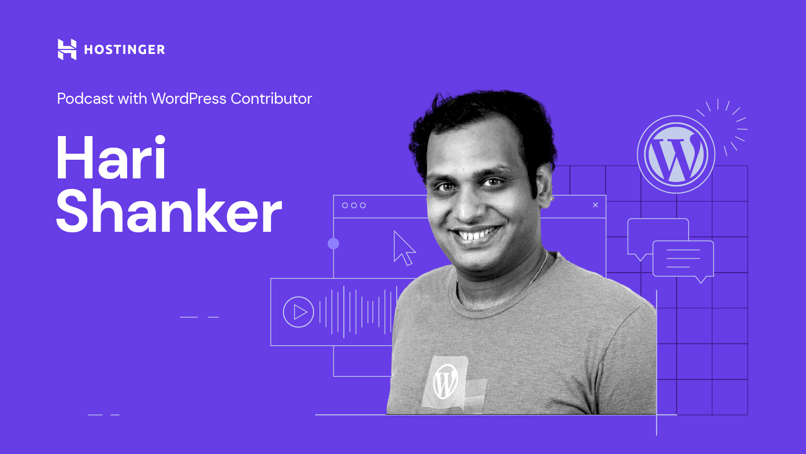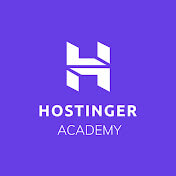Podcast With Hari Shanker: Nurturing Contributors for the Future of WordPress

Our latest guest in the Hostinger Academy podcast is Hari Shanker, an open-source program manager at Automattic. We sat down with him to discuss his role in fostering community contributions, which is crucial for WordPress sustainability.
The Background
WordPress is open-source software developed and maintained by a vibrant community. This community comprises developers, agencies, and freelancers who leverage the WordPress content management system for their needs while contributing to its code, bug fixes, and release cycles.
Given the critical role of community contributions to WordPress’s long-term success, we were keen to explore Hari Shanker’s efforts in nurturing this ecosystem.
Hari’s WordPress journey began in college when he discovered the platform’s extensive customizability. By 2016, he was deeply involved in India’s local WordPress community and began organizing Meetups.
In 2020, Hari became a full-time WordPress contributor. Now, as an open-source program manager, he focuses on boosting community participation through initiatives like Five for the Future and the Contributor Mentorship Program.
In this special episode recorded during WordCamp US 2023, Emma Young, Hostinger’s Head of Content, delves into the Five for the Future initiative, the Mentorship Program, and the potential benefits for companies contributing to WordPress.
Watch the Full Podcast
Watch the full podcast on the Hostinger Academy YouTube channel.

How Five for the Future Was Started
Matt Mullenweg wrote a simple blog post – that’s all it took to start the Five for the Future initiative. It was then formalized during the 2017 WordPress Community Summit. A few years later, its dedicated page was launched.
Currently, the page serves as a pledge platform, but Hari aims to evolve it into a more structured program offering clear guidance for contributors.

“It is a program where folks can sign up. But for new companies signing up, you may not have a ton of direction on what to contribute, where to contribute, and what areas WordPress teams need help with. So I’m trying to solve that problem.” says Hari.
Luckily for Hari, he’s not working on this alone. The WordPress Community Team fully supports him, especially after this year’s Community Summit. “I think you’ll see some excellent changes coming up in the next couple of years,” promises Hari.
For example, the Make WordPress project has just launched a new page, make.wordpress.org/contribute. It is a contributor orientation tool where users can get a list of teams that are suitable for their contributions.
“We have 22 teams – again, you do not need to know how to code to start contributing. There are a bunch of no-code ways to contribute to WordPress as well. So this tool will help you identify some teams,” Hari explains.
Inviting Organizations to Contribute Together
WordPress is a significant economic force – a 2021 study estimated that the combined global economy for WordPress is worth half a trillion dollars. While the platform has enabled countless organizations to thrive, Hari envisions more companies actively supporting WordPress itself.
“My ideal future is where all these companies work together, and all the needs of the project are met, and the project moves from maintaining to going to the next frontier,” explains Hari.
He acknowledges that there may be concerns when a company puts many resources into WordPress and takes control of the project. But he emphasizes that it’s not like that in an open-source environment.
“Everybody works together – that is the future that I envision. Even though they may be competitors in business, they all work together hand in hand. And it’s already happening.”
But why should companies contribute in the first place? While not every business might benefit from it, Hari gives a few examples.
Let’s say you are making money by developing plugins. You can try to join the WordPress Plugin Team, where you will learn plugin standards while contributing to the team. It can help you get up to speed with the coding standards and make a better plugin for the WordPress ecosystem.
Another example is agencies that can join the Core Team and have their clients’ voices heard in the development environment, especially when it comes to bugs to fix or features to develop.
In essence, contributing to WordPress provides a deeper understanding of what’s happening under the hood, allowing you to align your goals with the direction of WordPress development.
The Birth of the Contributor Mentorship Program
When working on the Five for the Future initiative, Hari did a lot of research to attract more contributors. One of his key findings was that WordPress has an onboarding issue for contributors.
“The problem is not the lack of resources. It’s like there’s too much information. When somebody wants to contribute to WordPress, and they go to the Make WordPress site and pick whatever teams they want, they cannot find their way,” he reveals.
This led Hari to post a proposal about the Contributor Mentorship Program, which received positive feedback. Plus, a mentorship program is also one of the project’s main priorities for 2023.
The project kicked off in March 2022 when the working group, consisting of contributors from the Americas, Europe, and Asia Pacific, had the first chat.
Long story short, the team decided to pick eight teams for the mentorship program. When the program was launched, it received a great response, with 50 people applying to be mentees. The first mentorship cohort started on July 12 with 13 mentees and 13 mentors – where they worked together closely for four weeks.
The inaugural cohort was a success. “Of the 13 people that we joined that joined, 11 graduated. So that’s even more than we expected. And these people are making ongoing contributions. A couple of them are actually here in WordCamp US,” shares Hari.
The success encouraged Hari and the working group to continue the program. The next cohort is planned for January 2024, although it’s not set in stone yet.
Advice for Starters and New Contributors
Despite how popular WordPress is, some beginners have just started their journey with it. If you’re one of those people, Hari has some advice for you.
First of all, he suggests trying some easy ways to test the platform, such as WordPress Playground, to see how it works and how you can create a website in minutes. You can also sign up for a hosting service and learn to set up WordPress yourself.

“Try out one of those tools, see how it works, enjoy the beauty of WordPress, and slowly try learning it,“ recommends Hari.
Once you’re diving deeper into WordPress, you might want to see how you can contribute to the software. Hari’s first advice is to use the tool in make.wordpress.org/contribute to find which team best suits you.
There are easy ways to contribute, such as uploading photos to the WordPress photo directory and translating WordPress with the Polyglots Team. Whatever team and contribution you choose, consistency is the key.
“Try making it a habit”, said Hari. “Find some time to do it on an ongoing basis, maybe 30 minutes a week. If you like it, consider doing this again. Make it a habit, explore more, and you will see that you learn through it. I think it’s one of the most underappreciated parts of our contribution.”


